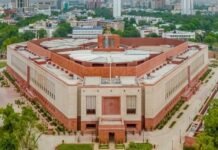New Delhi, Jan 5: Details of phone call records of terrorists, who attacked the Pathankot air base, mobile numbers of their handlers based in Pakistan and proof that they came from across the border are expected to be shared with the neighbouring country when officials of the two sides meet in near future.
Government officials said that whenever the two sides meet, be it at the Foreign Secretary-level or in National Security Advisor – level, all proof of Pakistani links of the terrorists would be given for action.
The call details of the phone used by the terrorists, number of their handler in Pakistan would certainly be shared with the neighbouring country in the next available opportunity for taking action against them, officials said.
The terrorist had snatched at least four mobile phones after hijacking the vehicle of Punjab Police SP Salwinder Singh, his jeweller friend Rajesh Verma and Singh’s cook and at least two of these phones were used to call their handlers in Pakistan.
The infiltrators also used two Pakistani SIMs to call their handlers, suspected to be based in Bahawalpur in Pakistan Punjab.
Security agencies are also trying to find out the antecedents of the terrorists who were killed in the operations so that their details could also be shared with Pakistan, sources said.
In the wake of the Pathankot attack as well as the strike on the Indian consulate in Mazar-e-Sharif in Afghanistan, both probably originating in Pakistan, indications were that next week’s scheduled visit by Foreign Secretary Jaishankar to Islamabad for talks will be put off.
It is likely that National Security Advisors of the two countries may have an urgent meeting in the next few days after which a call would be taken on the Foreign Secretary-level talks.
Meanwhile, the BSF submitted a report to the Centre about the possible route taken by the attackers claiming there was no breach in the fence but there were some gapping holes along the international border and malfunctioning of electronic surveillance equipment.
Senior BSF officials also visited Bamiyal, a village located in Pathankot, and took stock of the unfenced and riverine areas along the border with Pakistan.
The Home Ministry has directed the BSF, which guards the international border with Pakistan, to submit a report on the breach by terrorists who sneaked into India and carried out terror strike in Pathankot.
Officials said the BSF claimed in its report that there were no signs or evidence to suggest that the terrorists had breached the fence erected at maximum places along the border in Punjab or neighbouring Jammu.
However, there are numerous pockets and ‘nullahs’ which are unfenced and growth of elephant grass can provide an easy cover to the infiltrating group, the sources said.
While some of the Hand Held Thermal Imagers (HHTI) and Battle Field Surveillance Radars, placed at the places where fencing is not erected, did not pick up any signal, some of these equipment had some “technical glitch” resulting in non-registering of any activity, the sources said.
The BSF informed that after the Gurdaspur terror strike on July 27 last year, a battalion (1,000 personnel) had been deployed additionally along the Pathankot sector, they said.
Sources said as per initial reports, the terrorists might have entered India through one of the rivulets, which are unfenced, in Punjab.
Terrorists are believed to have taken route often used by drug smugglers to infiltrate into the border state of Punjab and unleash the deadly attack on the IAF base in Pathankot.
As the initial inputs suggest, the terrorists, who carried out the pre-dawn attack, had infiltrated through tributaries of river Beas in Pathankot in Bamiyal village, located close to the International Border.
They are believed to have infiltrated into India during the intervening night of December 30-31. The area from where the terrorists crossed over has a thick foliage of elephant grass which provides an automatic cover for them, they said.
A tributary of river Beas enters into Pakistan from this village and this route is popular with drug smugglers to enter India.




























